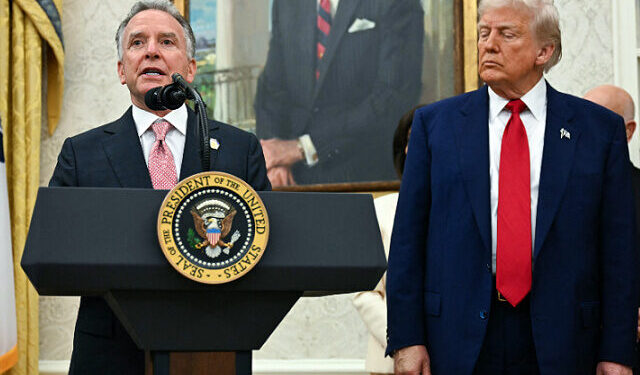President Donald Trump is once again taking the lead on the world stage—this time with a bold move toward stopping Iran’s nuclear ambitions and pushing for peace in the Middle East.
According to Axios, the Trump administration has proposed a meeting with Iranian officials this week to talk about two things: halting Iran’s nuclear program and negotiating a ceasefire with Israel. If the meeting happens, it would involve U.S. envoy Steve Witkoff and Iranian Foreign Minister Abbas Araghchi, and it could mark a major turning point in this growing conflict.
“A meeting with the Iranians this week is under consideration,” a U.S. official told Axios.
And while the meeting isn’t locked in yet, it’s very much in line with Trump’s strategy: use maximum pressure to bring the enemy to the negotiating table—on America’s terms.
One of the biggest cards Trump is holding is the U.S. military’s unmatched capability to destroy Iran’s heavily fortified nuclear site at Fordow—something Israel currently cannot do on its own.
Trump’s team is making it clear: this isn’t just a diplomatic effort—it’s backed by real force.
“Trump sees the massive bunker busters needed to destroy Iran’s underground enrichment facility at Fordow — which the U.S. has and Israel does not — as a key point of leverage to get Iran to cut a deal,” Axios reported.
A senior official described this as an “inflection point,” where Trump is leveraging America’s unmatched military tools to force Iran to reconsider its path.
“He thinks in terms of deals and leverage. And this is leverage,” the official said.
Unlike the weak and watered-down G7 proposal—which simply wanted to monitor Iran’s nuclear activity—President Trump has made his position crystal clear: Iran must halt all uranium enrichment. No exceptions.
As Breitbart News highlighted, Trump rejected the G7’s proposed statement on Iran because it didn’t demand a total shutdown of Iran’s nuclear program.
Why is that so important? Because once Iran enriches uranium past a certain point, the only logical use is for building a nuclear weapon. Monitoring is nothing more than a global shrug.
Sources inside the Trump administration say they’re not sure yet if Iran is truly ready to deal. As one official put it:
“We don’t know if Iran has been brought to their knees fully so that they realize that in order to have a country, they have to talk …”
That’s the Trump approach in a nutshell: use pressure until the other side has no choice but to negotiate—or collapse. And that pressure is mounting fast. Israel has been striking Iranian military targets, and Tehran is reeling. With reports of widespread airspace dominance by Israel, along with Trump’s refusal to let Iran even think about building a bomb, the regime is boxed in.
This proposed meeting could become one of the most significant diplomatic moments in recent memory—if Iran comes to the table. But it’s also a reminder of the kind of leadership Americans saw under Trump: strength first, diplomacy second—and never the other way around.
While the Biden administration has been largely absent—or worse, appeasing—Trump’s team is signaling loud and clear that America isn’t afraid to deal from a position of strength.
Trump’s possible meeting with Iran is not about concessions. It’s about using America’s power to secure peace through strength—a strategy that’s already drawing comparisons to his historic talks with North Korea.
This is diplomacy the America First way: no blank checks, no bowing to tyrants, and no tolerance for terror regimes building nuclear weapons.
If Iran wants to survive, they may soon find themselves sitting across the table from Donald Trump, hat in hand.
And that’s exactly where he wants them.




















